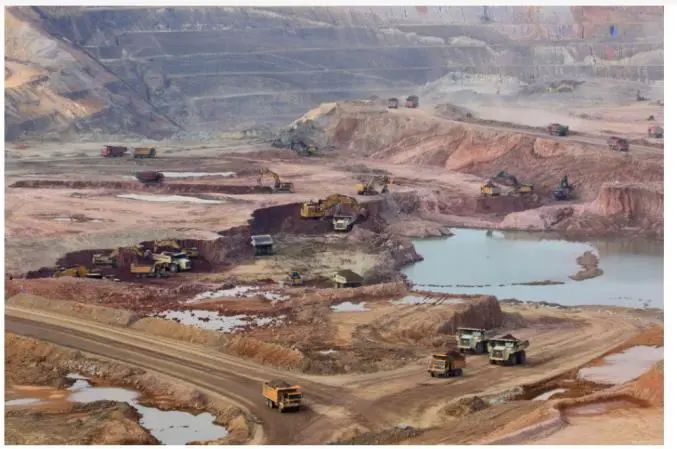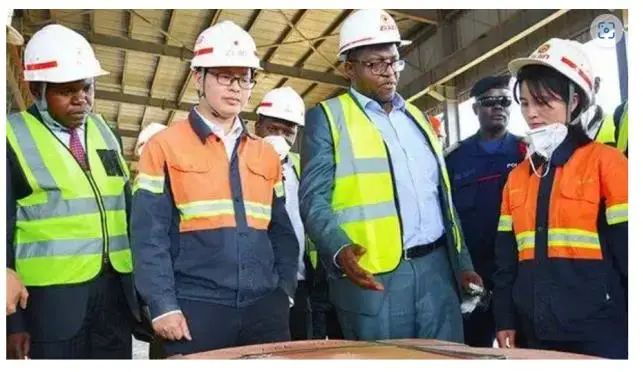The game between China and the United States in Congo mining industry from Antony Blinken's visit toIssuing time:2022-08-19 11:06 From August 9 to 10, US Secretary of State Antony Blinken paid an official visit to DRC. According to relevant reports, strengthening political cooperation with Congo, mediating relations between Congo and Rwanda and isolating Russia are the main purposes of this visit, but cooperation in the economic field, especially in the mining field, is also an important topic of this visit. According to internal sources of the Congolese mineral resources administration, during his meetings with Congolese President tshisekedi and Prime Minister luconde, Antony Blinken made it clear that he would assist Congo in protecting biodiversity, ensuring that mining investment meets environmental standards, and supporting the decision of the Congolese government to review mining contracts and strengthen the accountability system of the mining sector. Antony Blinken "implicitly" mentioned the ruokai accusation against Chinese mining companies for exploiting Congo's natural resources.
From August 9 to 10, US Secretary of State Antony Blinken paid an official visit to DRC. According to relevant reports, strengthening political cooperation with Congo, mediating relations between Congo and Rwanda and isolating Russia are the main purposes of this visit, but cooperation in the economic field, especially in the mining field, is also an important topic of this visit. According to internal sources of the Congolese mineral resources administration, during his meetings with Congolese President tshisekedi and Prime Minister luconde, Antony Blinken made it clear that he would assist Congo in protecting biodiversity, ensuring that mining investment meets environmental standards, and supporting the decision of the Congolese government to review mining contracts and strengthen the accountability system of the mining sector. Antony Blinken "implicitly" mentioned the ruokai accusation against Chinese mining companies for exploiting Congo's natural resources. At present, the United States hopes to build a new global supply chain. As a country with extremely rich mineral resources, Congo (DRC) is more important in the US foreign strategy. To this end, the United States continues to increase its control over Congo: increase its political support for Tshisekedi, exert pressure on Rwanda, Uganda and other neighboring countries of Congo, and force them to give up their support for the rebels of Congo, so as to maintain peace and stability in Congo; Economically, increase investment in Congo, especially in the field of energy resources. The United States is currently the country with the largest investment in the mining industry in Congo, and basically controls the mining and development of important strategic resources in Congo.
Since the beginning of the 21st century, China's investment in Congo has been developing rapidly in an all-round way, especially in mineral products and other resources. In 2016, China's investment in the steel mining industry reached US $1.578 billion, approaching US $1.845 billion. Before the arrival of Chinese enterprises, they had been the back garden of the US and European countries. Especially after the discovery of huge mineral reserves in Katanga, they never stopped taking advantage of them. China's investment in Congo's mineral resources has challenged the interests of the United States in Congo and moved their "cheese"
In order to prevent China's "expansion" in the mining sector of Congo, the United States used political and diplomatic means to brazenly obstruct and destroy. After Tshisekedi became President of Congo, the United States increased financial assistance to Congo, helped Tshisekedi set up an investigation committee, aimed at the US $6 billion mining contract signed by the former government and Chinese investors, and intended to drive Chinese enterprises out of the Democratic Republic of Congo (DRC) on the pretext of not meeting local mining standards and polluting the environment, thus creating space for the United States to re control the cobalt mining industry. Through funds and other forms of support, the United States manipulates some non-governmental organizations and even armed groups behind the scenes, creating obstacles for Chinese enterprises' projects. In Congo (DRC), international non-governmental organizations controlled by the United States and the West, such as the "Rights and Accountability Development Organization" (RAID), "Global Witness", "Extractive Industries Transparency Initiative" (EITI), "Grand Chile International", "Anti Impunity Human Rights Violation Organization" (ACIDH, with branches in Lubumbashi and other places), and non-governmental organizations in Congo, constantly collect local evidence against Chinese enterprises, From time to time, they accuse China of bribing officials, destroying the environment, making illegal profits, and employing child labor in Congo, thereby inciting discontent among Congolese people, encouraging local people to protest and demonstrate, and preventing the normal progress of Chinese funded projects. In 2016, Amnesty International published an investigation report entitled "Truth at all costs", accusing Chinese mining enterprises of employing Congolese (DRC) child workers for mining. The American media also stood on the high ground of morality and public opinion, creating rumors out of nothing and damaging Chinese enterprises. On November 29, 2021, Bloomberg launched an article demonizing the image of China in Africa, maliciously hyping commercial exchanges between Chinese enterprises and the former President Joseph Kabila's family of the Democratic Republic of the Congo (DRC) involved in corruption, implying that China is the "maker" of corruption in Africa. Antony Blinken's visit to Congo (Kinshasa) against the background of the "new cold war" is a further action of the United States against China's influence in Africa. The United States will not be willing to hand over the good resources to China. In the future, it will accelerate its investment in the mining industry in Congo, and will interfere with and destroy Chinese mining enterprises in an all-round way. It will just become a "new playground" for China and the United States to compete. This article was written by Liu Xiaojun, the dean of our research institute. If you need to reprint, please contact our company. |



